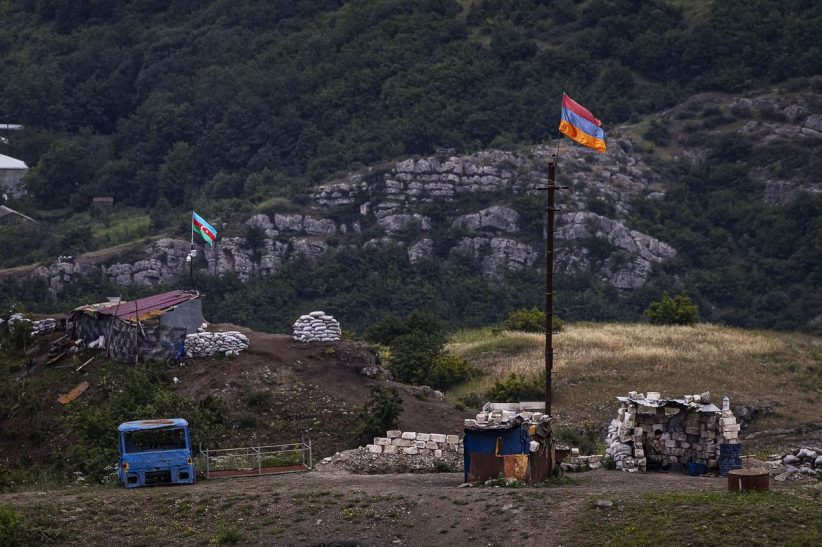By Mark Dovich
Armenian Deputy Prime Minister Mher Grigoryan met with his Azerbaijani counterpart, Shahin Mustafayev, for the first time Tuesday at an unspecified section of their two countries’ border, just a day after Yerevan and Baku announced the composition of a joint border commission.
None of the other dozens of Armenian and Azerbaijani officials included in the long-discussed commission took part.
“The parties reaffirmed their readiness to work within the commissions on demarcation and other relevant issues, including border security,” Armenia’s Foreign Ministry said in a short statement that was light on details.
Grigoryan and Mustafayev also reached an agreement to hold a second border meeting in Moscow, followed by a third meeting in Brussels, according to the Foreign Ministry read-out. Dates for those meetings have not yet been announced.
The border between Armenia and Azerbaijan remains undelimited and undemarcated, as it was once an internal Soviet boundary, so officially defining it was not of concern to the authorities at the time. Delimitation refers to the process by which a border is legally defined, while demarcation involves the process of physically marking a border, such as by building a fence or wall.
European Council President Charles Michel said in a tweet that he “warmly welcome(d)” the deputy prime ministers’ meeting, calling it an example of the “tangible progress” made following a meeting he hosted in Brussels over the weekend with Armenian Prime Minister Nikol Pashinyan and Azerbaijani President Ilham Aliyev.
Following lengthy talks in Brussels Sunday, the Armenian and Azerbaijani leaders “agreed to advance discussions” on a peace treaty, as well as to convene again in Brussels in July or August to continue negotiations, according to a statement from Michel.
The days since have seen a flurry of diplomatic activity by both sides, with Pashinyan calling U.S. Secretary of State Antony Blinken, Aliyev speaking by phone with Turkish President Recep Tayyip Erdoğan, and Russian Foreign Minister Sergey Lavrov holding separate calls with his Armenian and Azerbaijani counterparts.
Notably, Michel’s post-meeting statement urged that “the rights and security of the ethnic Armenian population in Karabakh be addressed,” but did not mention the issue of the region’s final status, which has long been at the heart of the Armenia-Azerbaijan conflict.
The inclusion of the phrase “the ethnic Armenian population in Karabakh” in Michel’s read-out has attracted much attention in Armenia, where observers recall that a statement from Michel following a separate meeting with Pashinyan and Aliyev last month failed to mention the region at all.
In a column for CivilNet, noted Karabakh analyst Tigran Grigoryan argued that “the presence of references to Karabakh in this section may give the impression” of being in Armenia’s interests, but that in fact, “this section is fully in line with Azerbaijan’s approaches.”
“Michel’s use of the term ‘Karabakh’ instead of ‘Nagorno-Karabakh’ is not accidental,” he continued. “After the end of the second Karabakh war, Baku declared that there is not even an administrative unit called ‘Nagorno-Karabakh.’ The use of the term ‘Karabakh’ corresponds to Azerbaijan’s position.”
Grigoryan added that “the Karabakh part of the statement fully corresponds to the logic of ‘lowering the bar,’” a reference to a statement Pashinyan made in parliament last month that many in Armenia viewed as an implicit acknowledgment that he was preparing to cede ethnic Armenian control over Karabakh to Azerbaijan.
Michel’s statement even prompted all four parties in the unrecognized republic’s parliament to issue a joint response, saying that “abandon(ing) the political and geographic concept of ‘Nagorno-Karabakh’…is completely in line with the positions articulated by the leadership of Azerbaijan…and demonstrates a retreat by the current authorities of Armenia on the foreign policy front.”
Ishkhan Saghatelyan, a senior lawmaker in Armenia’s parliament who has emerged as the leader of ongoing anti-government protests in Yerevan, also lambasted Michel’s read-out of the Brussels meeting, calling it an “anti-Armenian agreement.”
“There is only one way out of the current situation,” he added. “To get rid of this evil government as soon as possible.”
Anti-government demonstrators in Yerevan have escalated their acts of civil disobedience this week, blockading the president’s residence and the Foreign Ministry and Security Council buildings in the city center, as well as holding protests in the Yerevan metro.
The Armenian capital has seen nearly three weeks of daily anti-government protests, with thousands of people taking to the streets to demand that Pashinyan resign. The demonstrators, who have dubbed themselves the Resistance Movement, have also preemptively rejected any deal with Azerbaijan that would see Armenians lose control over Karabakh.
The protests have included public assemblies, marches, and acts of civil disobedience, as well as an indefinite sit-in at France Square, a major intersection in central Yerevan, leading to hundreds of detentions so far. The arrests have prompted Human Rights Defender Kristinne Grigoryan to criticize the police for disproportionate use of force and other acts of misconduct.
















